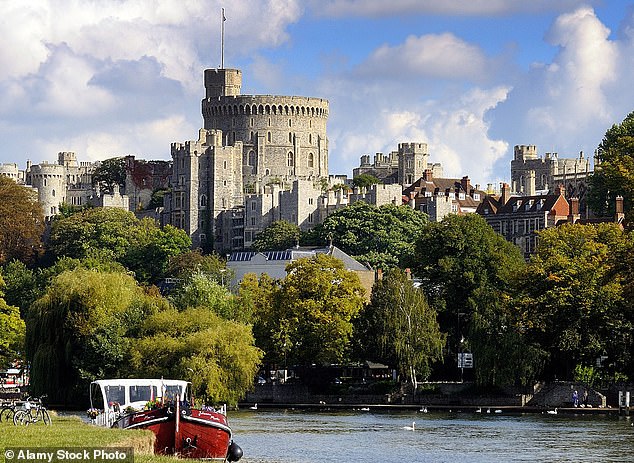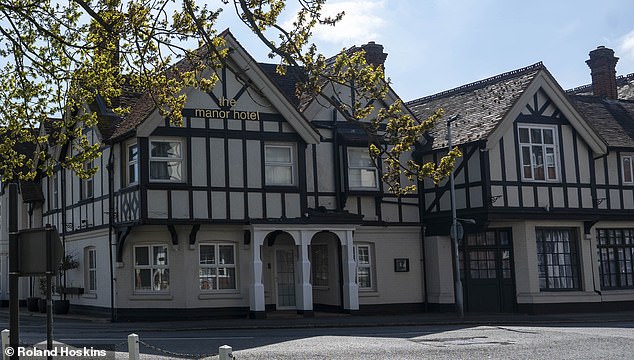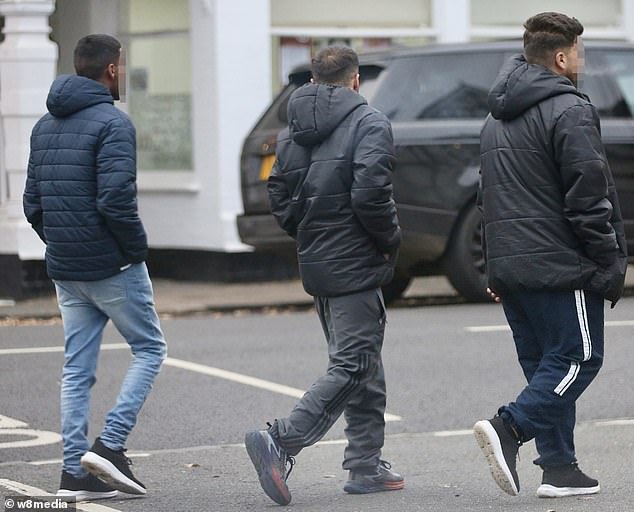The village of Datchet is perched on the lush banks of the River Thames. On the opposite side, a little over a mile away as the crow flies, you can see Windsor Castle and, when there are no leaves on the trees, Adelaide Cottage, home to the Prince and Princess of Wales.
Residents are constantly reminded of the area’s blue-blooded heritage – if indeed they could ever forget – when the royal cortege, a formal procession on horseback, passes through this small, close-knit community in Berkshire, the most regal of all English counties.
‘One of the police outriders blows a whistle and traffic is stopped,’ said a shopkeeper on the picturesque village green where the scene is a regular occurrence.
King Charles and Prince William are often seen through the windows of the passing cavalcade en route to the castle, and the late Queen was known to wave at locals.
Her Platinum Jubilee in 2022, marking 70 years on the throne, is commemorated with a plaque on a stone monument here, and there are independent shops and homes with names like Old Manor House, Rose Cottage and We Stitch & Fix (‘tailoring, alterations and bespoke services’).
Datchet’s gilded location in the shadow of Windsor Castle and just down the road from Eton College is reflected in the fact that the average home sells for £526,000, according to Rightmove.
Centrepiece is The Manor Hotel – ‘a haven of peace overlooking the village green’ – at least, that’s what its official website says.
The historic hotel is referenced in the novel Three Men In A Boat by Jerome K. Jerome – a humorous account of a boating holiday on the Thames, published in 1889 – with the narrator describing how he and his friends experienced difficulties getting lodgings for the night in the ‘riverside resort’.

Young male migrants from The Manor Hotel who are not allowed to work and with nothing to do spend their time hanging around the village

The King passes the village of Datchet en route to the castle. The residents say it is not a suitable place for an asylum hotel

The Manor Hotel is referenced in the novel Three Men In A Boat by Jerome K. Jerome – it is now home to around 85 male migrants
How apposite that storyline seems today, for the modern traveller would find it impossible, too.
The curtains of the hotel are permanently drawn and the entrance to the reception is locked.
A member of staff who answers the bell politely informs me that the premises are closed, even though up to 85 people are currently staying at the 43-bedroom venue.
They are migrants, however, not paying guests. And since their arrival in November, local opinion has been divided. But the one thing almost everyone we spoke to agreed on is that a small village like Datchet (with a population of around 4,000) is not a suitable place for an asylum hotel.
The royal connection and upmarket postcode have, of course, fuelled the controversy.
But while Britain’s illegal migration problem might predate the Labour Government, it was a manifesto pledge of theirs to end the use of hotels to house migrants. They haven’t.
The Manor Hotel is the sixth additional establishment to open in that role since last July. It was also a manifesto pledge to ‘smash the gangs’ which bring people here illegally. They haven’t.
The number of small boat arrivals between January and April 2025 stands at 8,888, 42 per cent higher than in the same period in 2024, a trend which shows no sign of reversing.
Behind the repurposed Manor Hotel is another all-too familiar narrative: a lack of consultation over the Home Office decision to commandeer the premises, with typically ruthless businessmen profiting handsomely from the arrangement courtesy of the taxpayer.
The bill to pay for housing asylum seekers in hotels came to more than £2.8billion last year – a fifth of the foreign aid budget.
The Prime Minister has now been urged, in a letter signed by more than 100 refugee organisations and NGOs (Non-Governmental Organisations), to terminate the contracts of outsourcing companies which manage the hotels on behalf of the Home Office because they are giving taxpayers ‘poor value for money’.
Migrants, they said, should be accommodated in flats, bedsits and large houses across different local authorities.
Inevitably, asylum seekers placed in hotels are largely young single men, certainly without families, tipping the balance of the local population.
So what effect has this all had on Datchet?
‘It was once a great village, really sought after, a place where we all knew each other. But it’s not anymore,’ said Juanita Almond, a former member of the parish council, who was walking her dog past the hotel when the Mail visited.
‘This place is dying. What’s happened at the Manor has had a lot to do with that. It was the hub of the village, where we’d hold meetings or meet up for drinks. We can’t now. It doesn’t feel like it used to here. The people who own the hotel are only out for money.’
She added: ‘There were police cars outside there a couple of weeks ago, but I am too fed up with the place now to even ask what was going on.’
Police insist there has not been a spike in crime linked to migrants. But this does not mean locals like Juanita, who has lived in Datchet for more than 30 years, are wrong.
Surely there can’t be many – in or outside the village – who think that housing scores of young single men, many from far-flung foreign climes, in a village of this size is appropriate.
And this is, in fact, the second time The Manor Hotel has been used to house migrants. The first cohort arrived in October 2022 and stayed for about a year, while the current group have been there since November.
More recently, however, Jack Rankin, the local Conservative MP, led a debate at Parliament’s Westminster Hall about the reopening of migrant hotels which, he said, have had a ‘detrimental effect . . . on local pride and community cohesion’.
Hence the spotlight now falling on his constituency. Mr Rankin revealed how he had received an email from the Home Office informing him of the imminent influx only at the last minute.

Asylum seekers placed in hotels are largely young single men, certainly without families, tipping the balance of the local population

Migrants from the Middle East and Africa turned up in Datchet by coach without the local community being given time to prepare
It said: ‘We have been working hard to maximise the use of our existing accommodation footprint but unfortunately it has become clear over the last 24 hours that we need to stand up additional capacity at pace.
‘As a consequence, we have, with ministerial approval, taken the urgent decision [sic] entered into a short-term contractual arrangement to reuse the Manor for asylum accommodation.’ The email included an apology ‘for the lack of notice’ and insisted that the move ‘had not been taken lightly’.
The next day, migrants from the Middle East and Africa turned up in Datchet by coach.
In a letter to the Home Secretary Yvette Cooper, Mr Rankin said he was ‘astounded’ that the local community had not been given more time to prepare.
Yet some believe the ‘lack of notice’ is actually a modus operandi.
Councillors in Altrincham, Cheshire, for example, received an encrypted email – a security measure which ensures that only the intended recipients can read it – informing them that nearly 300 asylum seekers were going to be put in a hotel in the market town at the 11th hour last year.
Perhaps it is just a coincidence but the common denominator between Datchet and Altrincham is that both are small, leafy, upmarket postcodes where, unlike major cities, there was likely to be local opposition.
‘These are undemocratic, draconian powers, like those they would have used in wartime, that have put the community under pressure,’ said David Buckley, an independent councillor and chairman of Datchet Parish Council, referring to the apparent secrecy and absence of consultation.
Whatever the truth, the impact is being felt in the village.
Take Nibbles, a family-run cafe behind The Manor Hotel which has been trading for the past 29 years. Owner Cheryl Bohdjalian said: ‘The closure of the hotel has not been good for business. Guests used to come over for breakfast or lunches and go to the pub for lunch which doesn’t happen any more.’
Down by the waterfront, Paul Clark operates a fleet of luxury holiday boats. He is the third generation of Clarks to run Kris Cruisers, a fixture on the riverbank for 59 years. ‘People would fly into Heathrow from overseas, have a night in the hotel and go out on the river for the day or a week,’ he said. ‘By not having a proper hotel, we have lost business.’
There have been other repercussions. The conversion of the Manor into an asylum hotel is a ‘material fact’, which, by law, has to be disclosed by estate agents to anyone buying a property in the vicinity.
The sale a few months ago of a £575,000 three-bedroom terrace house fell through within 24 hours of the prospective owner being told about the new ‘neighbours’. It eventually sold to someone else for £420,000.
‘The desirability fell off a cliff-edge,’ said someone who works for a rival property firm.
The Manor was also once a sought-after venue for weddings, with couples promised an ‘unforgettable celebration’ for up to 250 guests in the Royal Suite and photographs taken on the village green.
The truth, though, is that the company which has owned it for more than two decades, MG Hotels – owned by brothers Mandip and Sam Gill – have allowed the premises to become run-down and during the pandemic made most of the rooms available to house the homeless.
At the time, Sam Gill sought to reassure the community by promising: ‘We will be reopening as an hotel once we are through the pandemic and economic downturn.’
But when it did, some guests paying £130 a night found most of the accommodation was still, in fact, being occupied by homeless people.
A reviewer in 2022, who had made a reservation though Booking.com, warned: ‘What they fail to tell you is that this is an HMO (house in multiple occupation).’ He alleged that drug deals were taking place at the rear of the hotel.
Shortly after the homeless moved out, migrants moved in.
Among the current contingent is Farooq, 32, who fled Afghanistan to escape the Taliban last year and crossed the Channel with 65 others crammed into a small boat with no life jackets.
He spends most of his time at an outside gym in the park or playing football and cricket. ‘The people here are really nice,’ he said. But parish council chairman Mr Buckley added: ‘These young men are not allowed to work, so they cannot add value or help the community. They are forced to hang around in groups which speak their language and it makes women and girls fearful.’
One mother said her 21-year-old daughter was followed home after getting off the train. She suspected the person was a migrant and the incident was reported to the police.
There was no proof, her mother admitted, that the person was from The Manor Hotel, but the fact all of them are single men, from countries where views on women may be very different, had created an intimidating atmosphere.
The mother added: ‘It’s single men, always men.’
Inside The Manor Hotel migrants, including a number from the Kurdistan region of Iraq and Somalia, are housed two to a room.
‘They [the owners] are only interested in money, money, money,’ said the woman who runs Nibbles.
Indeed, the Gill brothers, who were given the opportunity by the Mail to respond, have made rather a lot of money out of migrants.
Latest accounts for MG Hotels show that shareholders’ funds – company assets belonging to them including profits from the sale of a sister hotel in Henley five years ago – have soared from £309,000 in 2019 to £2.8 million in 2024.
The good news for residents is that the migrants are expected to be moved next month. The bad news is that the homeless, we have been told, are returning.
Perhaps the main takeaway is that if all this can happen in the shadow of Windsor Castle – the royal cortege actually passes the Manor Hotel – nowhere is off-limits.
- Additional reporting: JIM NORTON and TIM STEWART







